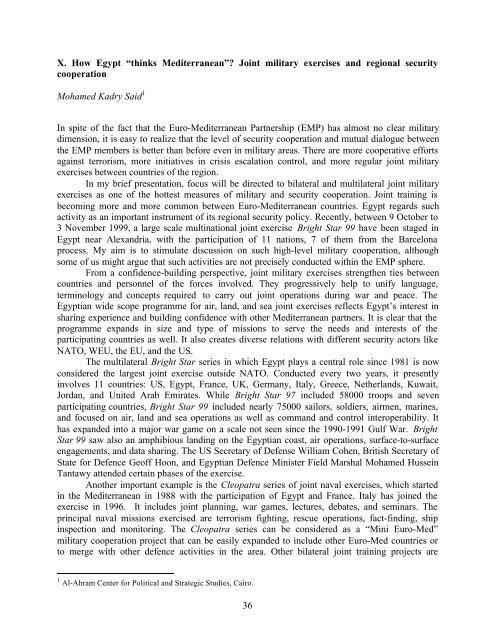The future of the Euro-Mediterannean security dialogue
The future of the Euro-Mediterannean security dialogue
The future of the Euro-Mediterannean security dialogue
You also want an ePaper? Increase the reach of your titles
YUMPU automatically turns print PDFs into web optimized ePapers that Google loves.
X. How Egypt “thinks Mediterranean”? Joint military exercises and regional <strong>security</strong><br />
cooperation<br />
Mohamed Kadry Said 1<br />
In spite <strong>of</strong> <strong>the</strong> fact that <strong>the</strong> <strong>Euro</strong>-Mediterranean Partnership (EMP) has almost no clear military<br />
dimension, it is easy to realize that <strong>the</strong> level <strong>of</strong> <strong>security</strong> cooperation and mutual <strong>dialogue</strong> between<br />
<strong>the</strong> EMP members is better than before even in military areas. <strong>The</strong>re are more cooperative efforts<br />
against terrorism, more initiatives in crisis escalation control, and more regular joint military<br />
exercises between countries <strong>of</strong> <strong>the</strong> region.<br />
In my brief presentation, focus will be directed to bilateral and multilateral joint military<br />
exercises as one <strong>of</strong> <strong>the</strong> hottest measures <strong>of</strong> military and <strong>security</strong> cooperation. Joint training is<br />
becoming more and more common between <strong>Euro</strong>-Mediterranean countries. Egypt regards such<br />
activity as an important instrument <strong>of</strong> its regional <strong>security</strong> policy. Recently, between 9 October to<br />
3 November 1999, a large scale multinational joint exercise Bright Star 99 have been staged in<br />
Egypt near Alexandria, with <strong>the</strong> participation <strong>of</strong> 11 nations, 7 <strong>of</strong> <strong>the</strong>m from <strong>the</strong> Barcelona<br />
process. My aim is to stimulate discussion on such high-level military cooperation, although<br />
some <strong>of</strong> us might argue that such activities are not precisely conducted within <strong>the</strong> EMP sphere.<br />
From a confidence-building perspective, joint military exercises streng<strong>the</strong>n ties between<br />
countries and personnel <strong>of</strong> <strong>the</strong> forces involved. <strong>The</strong>y progressively help to unify language,<br />
terminology and concepts required to carry out joint operations during war and peace. <strong>The</strong><br />
Egyptian wide scope programme for air, land, and sea joint exercises reflects Egypt’s interest in<br />
sharing experience and building confidence with o<strong>the</strong>r Mediterranean partners. It is clear that <strong>the</strong><br />
programme expands in size and type <strong>of</strong> missions to serve <strong>the</strong> needs and interests <strong>of</strong> <strong>the</strong><br />
participating countries as well. It also creates diverse relations with different <strong>security</strong> actors like<br />
NATO, WEU, <strong>the</strong> EU, and <strong>the</strong> US.<br />
<strong>The</strong> multilateral Bright Star series in which Egypt plays a central role since 1981 is now<br />
considered <strong>the</strong> largest joint exercise outside NATO. Conducted every two years, it presently<br />
involves 11 countries: US, Egypt, France, UK, Germany, Italy, Greece, Ne<strong>the</strong>rlands, Kuwait,<br />
Jordan, and United Arab Emirates. While Bright Star 97 included 58000 troops and seven<br />
participating countries, Bright Star 99 included nearly 75000 sailors, soldiers, airmen, marines,<br />
and focused on air, land and sea operations as well as command and control interoperability. It<br />
has expanded into a major war game on a scale not seen since <strong>the</strong> 1990-1991 Gulf War. Bright<br />
Star 99 saw also an amphibious landing on <strong>the</strong> Egyptian coast, air operations, surface-to-surface<br />
engagements, and data sharing. <strong>The</strong> US Secretary <strong>of</strong> Defense William Cohen, British Secretary <strong>of</strong><br />
State for Defence Ge<strong>of</strong>f Hoon, and Egyptian Defence Minister Field Marshal Mohamed Hussein<br />
Tantawy attended certain phases <strong>of</strong> <strong>the</strong> exercise.<br />
Ano<strong>the</strong>r important example is <strong>the</strong> Cleopatra series <strong>of</strong> joint naval exercises, which started<br />
in <strong>the</strong> Mediterranean in 1988 with <strong>the</strong> participation <strong>of</strong> Egypt and France. Italy has joined <strong>the</strong><br />
exercise in 1996. It includes joint planning, war games, lectures, debates, and seminars. <strong>The</strong><br />
principal naval missions exercised are terrorism fighting, rescue operations, fact-finding, ship<br />
inspection and monitoring. <strong>The</strong> Cleopatra series can be considered as a “Mini <strong>Euro</strong>-Med”<br />
military cooperation project that can be easily expanded to include o<strong>the</strong>r <strong>Euro</strong>-Med countries or<br />
to merge with o<strong>the</strong>r defence activities in <strong>the</strong> area. O<strong>the</strong>r bilateral joint training projects are<br />
1 Al-Ahram Center for Political and Strategic Studies, Cairo.<br />
36
















